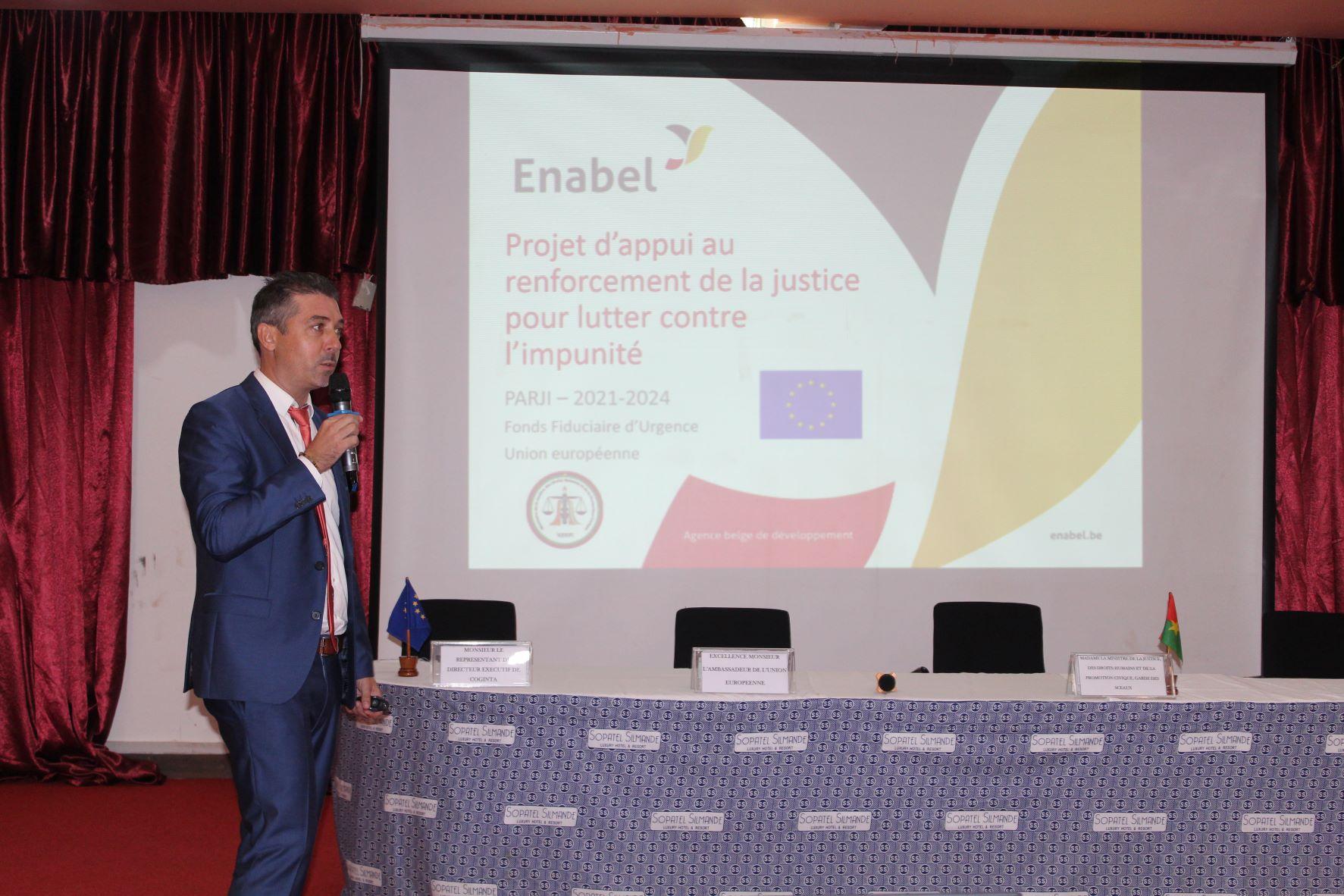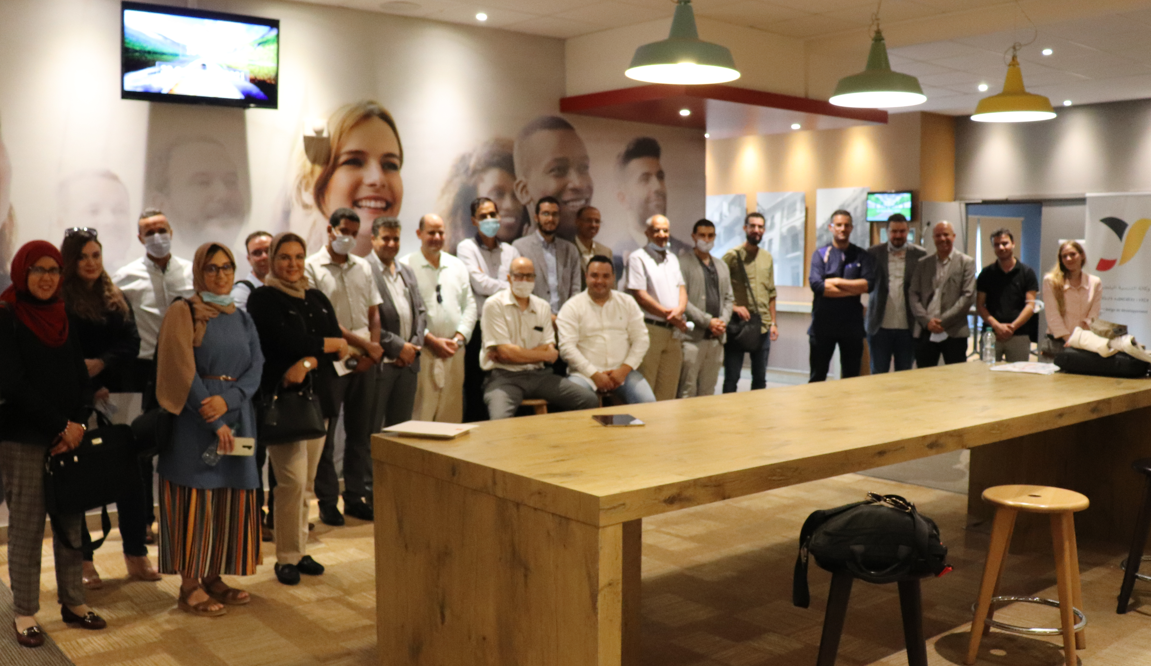Search
Viewing 1245 to 1260 of 2520 news
-

Celebrating Teachers’ Efforts Towards Education Recovery in Uganda
Peace NERIMA | 21/10/2021
International Teachers day was on 5th October 2021 and with it a reminder that for nearly two years the education system across the world is still facing significant challenges caused by the disruptions from the COVID-19 pandemic. As this year’s theme was ‘Teachers at the heart of Education recovery’, we reflected on the irreplaceable value of the teaching profession in society but also on the difficult working conditions teachers were facing and what they did to mitigate them. This theme came at a crucial time for teachers in the National Teachers’ Colleges (NTCs) because they were on the frontlines of ensuring learning continuity in Uganda when schools were closed. They had to rapidly adapt to distance learning and manage new digital tools while providing socio-emotional support to their students.The teachers in the NTCs proved beyond reasonable doubt the exceptional role they played and set an example of the great work teachers in Uganda are capable of achieving. From the first school lockdown in March 2020, NTC teachers embraced and proactively participated in the development of new education innovations to ensure the continuity of learning. They started by creating the TTE Sandbox that set the pace for the creation of many more digital innovations such as;The very first online General Teaching Methods (GTM) course, a professional online course that was introduced to NTC lecturers and students to improve their teaching skills.The Technology Enhanced Learning (TEL) Course which provides knowledge and skills to apply digital tools in order to enhance teaching and learning in educational settings. Here, the NTC lecturers played an important role in the development of this course, as they created digital content for two important tools in the course; screencasts and podcasts.The Academic Management System which is a digital system developed for capturing all college activities or data that is related to academic management. Some of the data includes staff and student registration, student applications, registration and admission, Human Resource Management and inventory management.Therefore, this year at the TTE project, we celebrated the exceptional dedication and courage of all teachers in the National Teachers Colleges, as well as their capacity to adapt and innovate under very challenging and uncertain conditions. They are indeed at the heart of the education recovery efforts and are key in accelerating progress towards inclusive, equitable and quality education for all learners.The National Teachers’ Colleges shared their experience from the lockdown and how they turned the situation around to enable the continuity of learning for their students on a Teachers’ Day talk show.
-

Using Renewable Energy to Support Teaching and Learning in Uganda
Dorothy KYAMAZIMA | 21/10/2021
The expansion of renewable energy across the world goes beyond the provision of reliable energy and climate protection. It ensures that people are provided with sustainable energy for important basic needs and services such as safe drinking water, safe electrified environments and conducive teaching and learning spaces.With the support from Enabel and the Brussels Capital Region, communities across Uganda are now adopting renewable energy approaches to reduce their carbon footprint while providing improved service delivery especially in the case of National Teachers’ Colleges and Vocational Training Institutions. Find out more on how biogas systems, briquette plants, energy-saving stoves and solar electricity is improving teaching and Learning in the NTCs and VTIs.
-
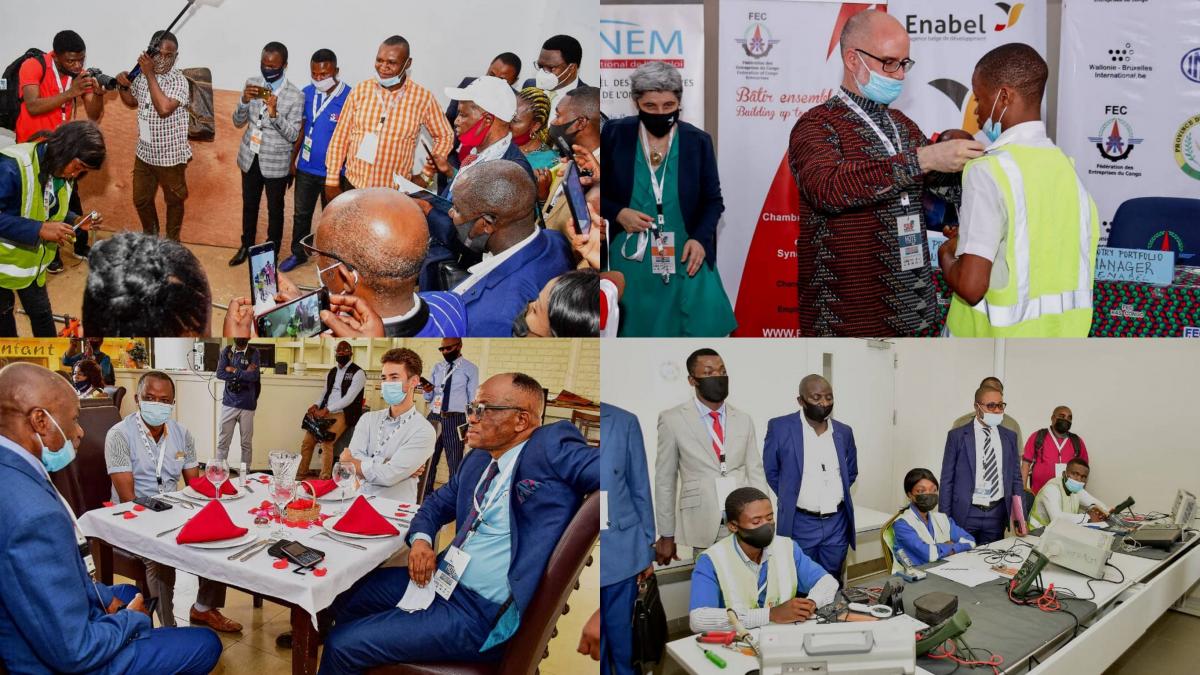
Participation au Salon des Métiers et de la Formation à Lubumbashi
Donavine KWIZERA | 20/10/2021
La dernière semaine de septembre 2021, une délégation du projet ACFPT a eu le plaisir de visiter la 5e Edition du Salon des Métiers et de la Formation à Lubumbashi, qui a eu lieu du 28 au 30 Septembre 2021. Durant cette semaine a eu lieu la 4e compétition des métiers, plus connue sous le nom de RDC Skills, soutenue par le projet EDUKAT.Au total, 129 participants de 4 provinces différentes ont pris part à la compétition, répartis en pas moins de 20 métiers différents ! Afin d'améliorer l'adéquation formation-emploi dans la province du Haut-Katanga en RDC, le projet EDUKAT d’Enabel et la Fédération des Entreprises du Congo (FEC) ont uni leurs forces il y a quatre ans et ont décidé d'organiser une compétition des métiers selon le modèle World Skills pendant le Salon des Métiers et de la Formation, qu’ils organisaient déjà auparavant. L’objectif de cette compétition était de revaloriser les professions et à rapprocher les secteurs public et privé.Depuis cette première édition, le concours a connu une évolution remarquable, car à l'origine il n'y avait que 7 métiers et le concours était limité à la province du Haut-Katanga; lors de cette quatrième édition, pas moins de 20 métiers étaient représentés et les participants étaient venus de 4 provinces différentes. Dans le cadre de l'apprentissage « peer to peer » et en vue d'organiser des activités similaires au Burundi dans le futur, une délégation burundaise du projet ACFPT a participé à cette quatrième édition du SMF. Cette délégation a été très impressionnée par ce que leurs collègues congolais ont réalisé à Lubumbashi. Pendant cette visite, il a été constaté à quel point les autorités et le secteur privé ont été étroitement associés à l'événement. Il est apparu clairement qu'Enabel, avec son partenaire la FEC, essaie depuis des années de mettre tous les acteurs sur la même longueur d'onde et que cette approche durable porte progressivement ses fruits. L’organisation de cet événement est une étape significative, car travailler avec de nombreux partenaires et des jeunes de différentes provinces n'est pas une tâche facile ! Cependant, ce qui a été le plus frappant dans l'ensemble de l'événement, c'est l'effet motivant que le concours a eu sur les jeunes qui ont participé, et l'effet d'entraînement que cela a eu sur tous les autres participants, du gouvernement aux entreprises. Pour organiser ce concours, Enabel et la FEC reçoivent le soutien de World Skills Belgique, l’association belge de promotion des métiers techniques et manuels, qui a préparé les compétiteurs à travers des coachings adaptés. Chaque année, la barre est placée plus haut pour les participants et en 2022, une délégation congolaise se rendra même en Namibie pour World Skills Africa ! Sur la base de cette expérience fantastique, l'équipe de l'ACFPT va maintenant se préparer à organiser une compétition similaire au Burundi en temps voulu, en commençant par trouver des partenaires appropriés. Qui sait, peut-être que dans quelques années, nos jeunes Burundais rivaliseront avec leurs homologues congolais pour la médaille d'or !
-
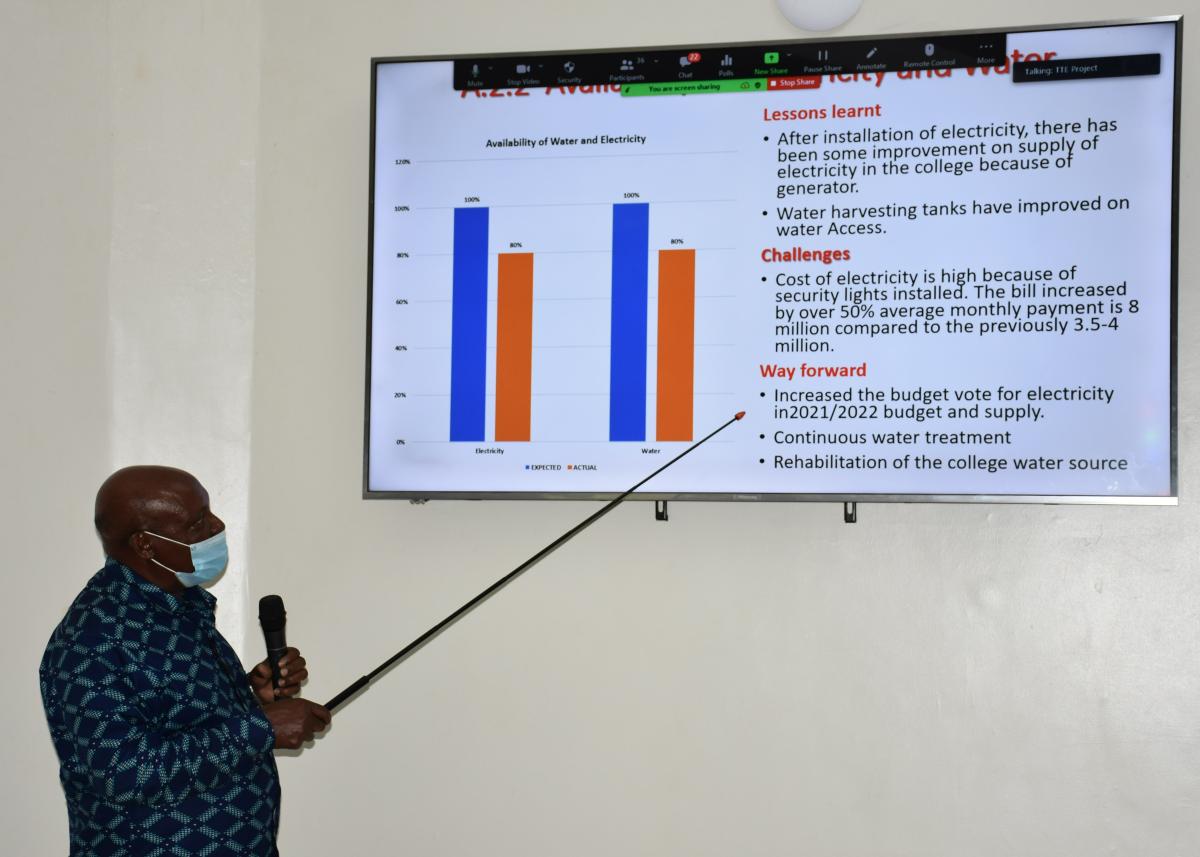
Enabel fast tracks a digital response to Results-Based Management in Teacher Colleges – Uganda
Peace NERIMA | 20/10/2021
Results-Based Management (RBM), a process that involves participatory planning, collaborative implementation, transparent accountability and, monitoring and evaluating planned activities was first introduced in the National Teachers’ Colleges (NTCs) in 2017. This was done with the purpose of enabling college management teams to make well informed decisions and improve on their service delivery.However, due to the COVID-19 pandemic that led to the closure of learning intuitions, colleges have had a difficult time sustaining the RBM process. To solve this, the Teacher Training Education project (TTE) has introduced a new digital approach to RBM in the NTCs. The focus here is to support management teams in the colleges to develop work plans, budgets and, monitor and report the progress of implemented activities remotely. With support from the TTE project, digital tools such as Google Sheets, Google Drive and Zoom have been introduced to aid the RBM process.After going through the online process, here are some ways the National Teachers’ Colleges are benefiting from digitalizing RBM.The new digital approach to RBM has helped to solve the problems associated with the collection and sharing of data in a timely manner. With these digital tools, college committee members can meet remotely through Zoom and, compile and input data in real-time using Google Sheets and Google Drive. This has helped NTCs save time and expenses associated with hosting physical meetings which are costly and involve lengthy deliberations. It has also improved the speed and accuracy of collecting and reporting data. Speaking at the quarterly review meeting on 1st September 2021, Clare Atuhire an Intervention officer at the TTE project said that within 3 days of this year’s quarterly review workshop, almost all colleges were able to analyse and collaboratively input data using the new digital tools.“During the face-to-face sessions, the data collection exercise was time-consuming as members engaged in endless deliberations while filling the hard copy sheets. Today, it is time-saving because members can fill in data at their convenience.” Enoch Baguma- NTC KabaleDigitalizing RBM practices in the NTCs has also promoted transparency and accountability by encouraging ownership and participation from all college teams. Initially, the planning, budgeting and reporting of college activities was the work of a handful of college managers such as school bursars and principals. However, with Google Sheets, college teams can access information remotely and contribute ideas where necessary.In terms of reporting, colleges are able to present data to committees in an analytical, systematic and summarised manner making the process easier, smarter and cost-effective. The use of paper is a thing of the past as committees have embraced online reporting through Google Drive. Additionally, the user-friendly digital tools have presented a chance for committee members to improve on their ICT skills which has, in turn, made them more efficient during reporting processes.In order to sustain the best practices of Results-Based Management in the NTCs, special reporting templates have been availed to the colleges for sharing work plans to ease the reporting on RBM. Colleges have also been encouraged to budget for RBM activities and make reports to the Ministry of Education and Sports on a quarterly basis.Over the years, Results-Based Management has proved to be a game-changer in the NTCs and with the new digital twist, colleges are now using online tools to implement RBM remotely.
-
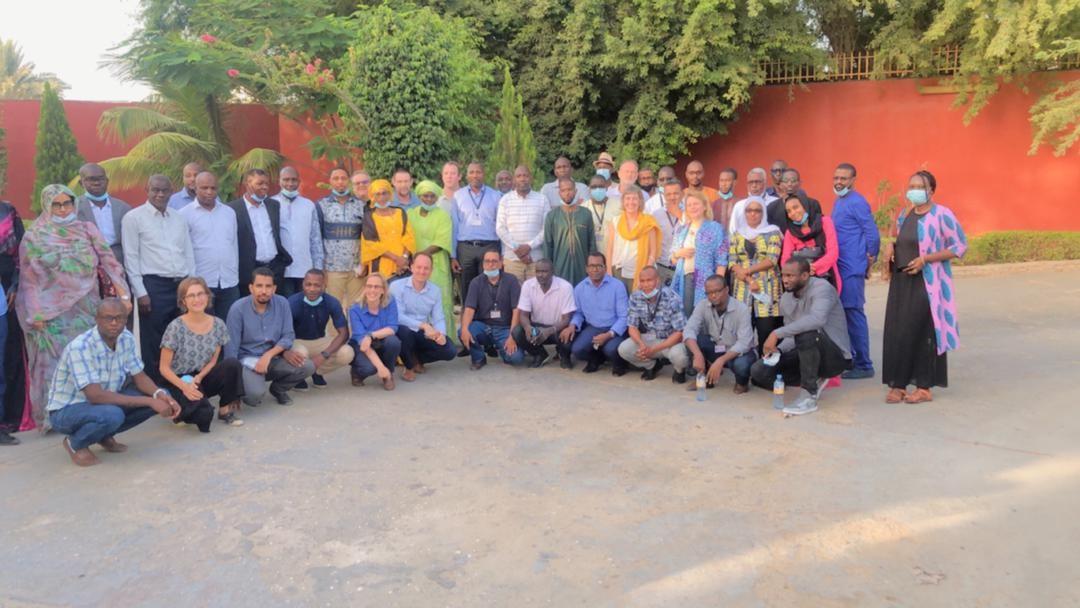
Enabel Mauritanie reçoit la visite de Jean Van Wetter, directeur général d'Enabel
Aminata KANE | 20/10/2021
La visite du Directeur général Jean VAN WETTER et de la Représentante résidente Evelien MASSCHELEIN du 27 au 29 septembre 2021 a permis de mettre en avant l'expertise de l'équipe Enabel en Mauritanie. Une réunion composée de l'ensemble du personnel a eu lieu le 27 septembre afin d'échanger sur les actions d'Enabel en Mauritanie dans les secteurs de la santé (AIPASS) et du développement rural (RIMFIL/RIMDIR). Cette rencontre était la première pour la nouvelle Représentante résidente et pour le Directeur général avec l'équipe mauritanienne. Le tout a débuté avec les présentations des invités, puis s'en sont suivis les exposés des Intervention Managers de la santé (programme AIPASS) puis par celui du développement rural (programme RIMFIL/RIMDIR), ponctués par des questions-réponses des collègues et des félicitations/remerciements.Le DG a expliqué la stratégie 2030. Il a ajouté que la réputation d’Enabel repose sur la qualité de son travail puis rappelé les priorités de l’action :Act for impact: stratégie vision 2030, une stratégie sur 10 ans qui dépasse les sensibilités politiquesADN Enabel : une adaptation ancrée et un apport de solutions adapté au contextePrésence sur le terrain: une compréhension du contexte et la connaissance du terrainLa Représentante résidente basée au Maroc, Evelien MASSCHELEIN a repris le flambeau en félicitant à son tour l'équipe et en faisant passer le message de l'ambassadeur belge sortant qui avait mis en avant le travail fait en Mauritanie. Le 28 septembre, le Directeur général d’Enabel a rencontré le ministre de la Santé, M. Sidi Ould Zahaf. L’audience a permis de suivre l’évolution des projets dans lesquels intervient Enabel dans le domaine de la santé ainsi que ceux qui constituent un défi pour le département afin de les inclure dans le cadre du partenariat. Depuis 2017, l’agence met en œuvre, en Mauritanie, des actions financées par l’Union européenne dans les secteurs du développement rural et de la santé. L’intervention d’Enabel Mauritanie dans le domaine de la santé permettra la garantie de l’accès à des services de santé de qualité. La première phase a concerné une assurance maladie pouvant être étendue à tout le territoire. Dans une seconde phase, Enabel accompagnera la Mauritanie dans la mise en place de réformes concernant le développement sanitaire, la programmation du secteur et la mise en place d'un fonds pour une couverture santé universelle. S’en est suivie pour la Représentante résidente et le Directeur général accompagnés par le Chef de Coopération de la Délégation de l’Union européenne, Jean-Marc DEWERPE une visite de deux structures de soins; le Centre de santé de Dar Naïm et le Centre de santé de Tab Salam Diam. Les responsables de chacune de ces structures ont présenté les activités et réalisations menées dans le contexte de l’appui du programme AI-PASS.Les responsables d’Enabel ont ensuite été reçu par le ministre de l’Élevage, M. Lemrabott Ould Benahi puis par le ministre des affaires étrangères, M. Ismail Ould Cheikh Ahmed, leurs échanges ont porté sur le partenariat entre la Mauritanie et Enabel. Ces échanges fructueux entre les parties ont permis de mettre en avant les expertises, les attentes et la formation d'une réflexion pour les actions de demain. Toute cette effervescence apporte une plus-value à Enabel et une vue stratégique sur le long terme.
-
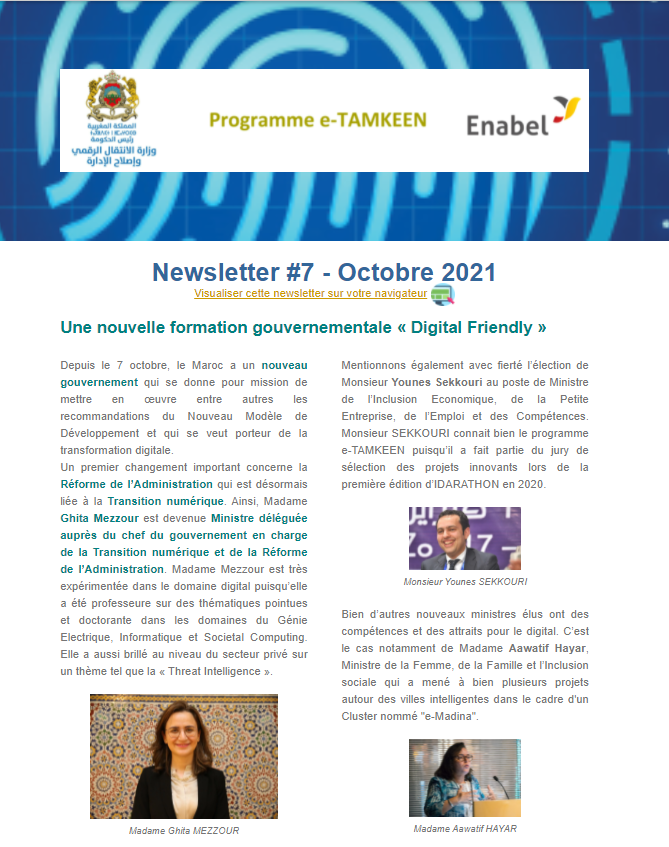
Consultez la 7éme newsletter trimestrielle de l’intervention e-TAMKEEN du Maroc
Bassam ALAOUI MDAGHRI | 18/10/2021
Ne manquez pas la septième newsletter trimestrielle de l’intervention eTAMKEEN, un projet de renforcement des compétences des fonctionnaires au niveau central et local en matière de #digitalisation.Ce numéro s’intéresse particulièrement à la nouvelle formation gouvernementale, ainsi que sur l'actualité de la coopération Marocco-Belge. Cette newsletter informe également sur les activités en cours du programme e-TAMKEEN et annonce les rendez-vous à ne pas manquer.Consultez la newsletter via ce lien : https://bit.ly/3aGdNXd Inscrivez-vous à nos prochaines Newsletter via ce lien : http://eepurl.com/gYow-5
-
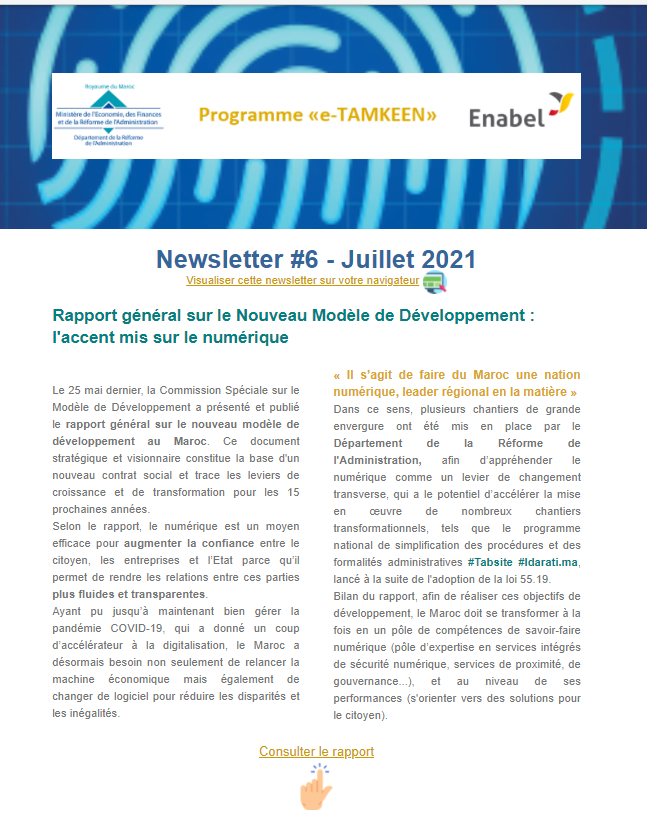
Consultez la 6éme newsletter trimestrielle de l’intervention e-TAMKEEN du Maroc !
Bassam ALAOUI MDAGHRI | 18/10/2021
Ne manquez pas la sixième newsletter trimestrielle de l’intervention eTAMKEEN, un projet de renforcement des compétences des fonctionnaires au niveau central et local en matière de digitalisation.Ce numéro s’intéresse particulièrement à l’accent mis sur le numérique dans le rapport général sur le Nouveau Modèle de Développement. Il informe également sur l’actualité digitale dans le secteur public et des plateformes digitales les plus utiles en cette période de pandémie COVID19.Consultez la newsletter via ce lien : https://bit.ly/2UiDvNaEt pour vous inscrire à nos prochaines Newsletters, c'est par ici: http://eepurl.com/gYow-5Bonne lecture !
-
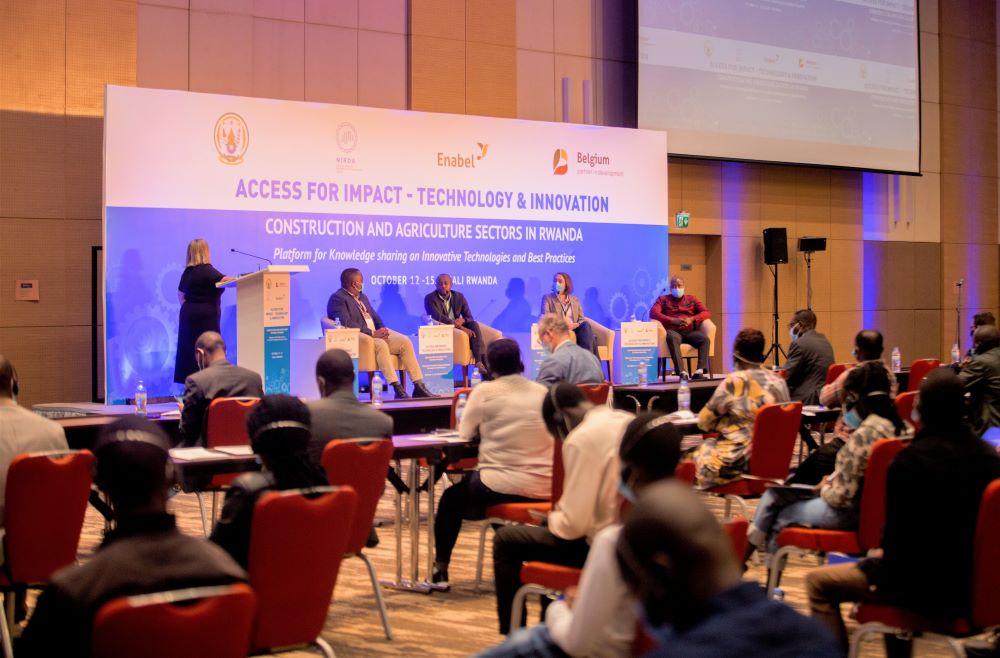
Kigali-Rwanda: The Access for Impact – Technology and Innovation event to boost the Agriculture and Construction sectors
Denise NSANGA | 18/10/2021
Co-organized by the National Industrial Research and Development Agency (NIRDA) and Enabel, this 4-day event that kicked off on 12 October 2021 in Kigali has brought together Rwandan and international companies and experts in animal feeds, poultry, piggery, stone, clay, bamboo and agri-by products to foster exchanges and knowledge transfers on various best practices, techniques, production processes and innovation. Speaking at the event, Ambassador Bert Versmessen said: “With the Belgian contribution in Urbanization and Agriculture sectors, Enabel is supporting the private sector around three main themes: Access to Technology, Access to Finance and Business Development Services”. He encouraged the Rwandan Private Sector to embrace the opportunities provided to them through NIRDA, and to use this forum to make innovation a key driver to help increase productivity, quality, and to contribute to achieving the objectives of the Government of Rwanda regarding “Made in Rwanda” products. Officiating the event, the Permanent Secretary in Rwanda’s Ministry of Commerce, Yves Bernard Niyingabira, hailed the Kingdom of Belgium for their continued support in the economic development of Rwanda, more specifically in the promotion of industries engaged in the agriculture and urbanisation sectors. The National Industrial Research and Development Agency (NIRDA) also commended the Kingdom of Belgium for the long-time partnership with the Republic of Rwanda and particularly its role in the national development. NIRDA’s Director General, Christian Sekomo Birame said: “NIRDA is currently partnering with Enabel in supporting the private sector development, mainly in the construction and agriculture sectors, through our Open Calls Program.” Participants included the different value chain actors, products manufacturers, processors, and technology sellers as well as other sector contributors and regulators who had the opportunity to network and further boost the Made in Rwanda value chains. Universities students, government representatives as well as both PRISM (Partnership for Resilient and Inclusive Small stock Market) and UEDI (Urban Economic Development Inititative) projects’ partners also took part in the event. Some participants were given the opportunity to visit local companies in order to better acquire practical knowledge and exchange on best practices.
-
En RDC, le projet EDUT accompagne les jeunes vers leurs métiers d'avenir
Fabrice KANKU MABIKA | 11/10/2021
Abigaël, Belinda, Junior et leurs amies, des noms typiques de jeunes gens qui rêvent d'avenir.Des noms d'emprunts certes, mais qui reprennent ceux des 20 jeunes qui, à ce jour, détiennent de nouvelles compétences techniques pour des métiers porteurs à la Tshopo. Compétences acquises après 6 mois de formation à l'Institut National de Préparation Professionnelle, INPP-Tshopo.Après qu'ils aient été suivis, au niveau psychologique, par le Centre Prince AL WALEED, soutenu par le PLVS (Programme de Lutte contre les Violences Sexuelles), EDUT a pris en charge leur insertion économique. L’aventure a commencé par un coaching mental puis une formation technique sur les trois métiers de leurs choix, à savoir: Coiffure et Esthétique (7 candidates), Coupe et Couture (6 candidats dont un garçon) et Transformation Agroalimentaire-Boulangerie et Pâtisserie (7 candidates).La principale motivation de cette action de formation était que ces jeunes acquièrent des compétences nécessaires de manière à développer des comportements professionnels pour leur auto-prise en charge et qu'ils soient capables de se lancer dans des Activités Génératrices de Revenus. Les critères de sélection portaient sur le degré de vulnérabilité, leur niveau de compréhension, l'âge et la disponibilité.Aujourd'hui, orientés vers l'Incubateur ELIKYA de la FEC-Tshopo, ces jeunes sont insérés dans un parcours d'initiation à l'entreprenariat.Et, vivement la deuxième cohorte !
-
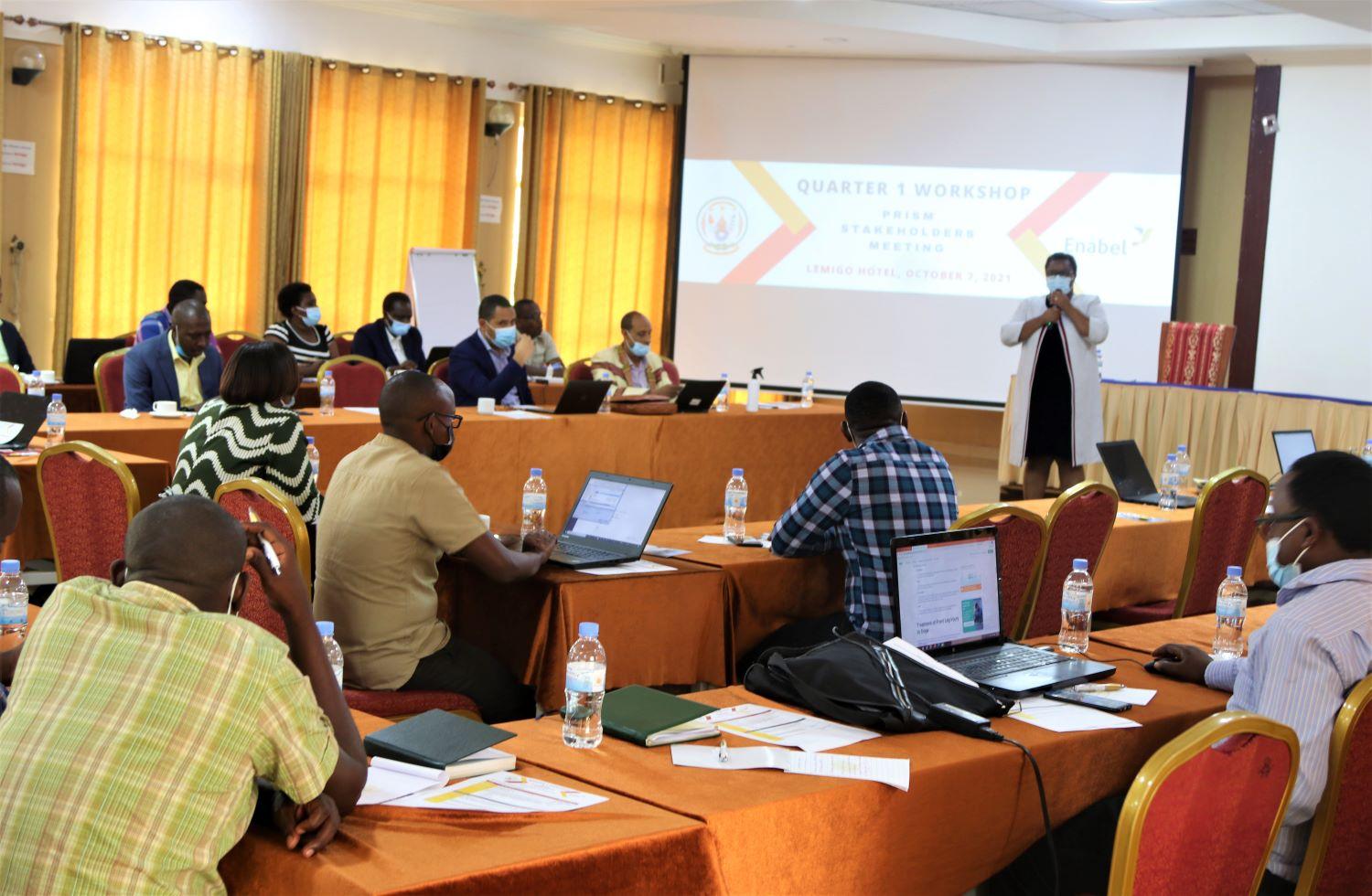
Rwanda: PRISM – Enabel Stakeholders meet to assess Quarter 1
Denise NSANGA | 09/10/2021
Enabel’s intervention in the Partnership for Resilient and Inclusive Small stock Market (PRISM - Enabel) is a five-year, multi stakeholder project that started in July 2019 with the aim of contributing to the reforms and transformation of the Pork, Poultry and animal feed value chains in Rwanda. On 7th October 2021, PRISM-Enabel held its Quarter 1 Stakeholders Workshop in Kigali to review the progress of activities, action plan, budget execution and challenges of Q1, as well as ways to improve the coordination of activities among PRSIM Stakeholders. Chaired by the Rwanda Agriculture Board (RAB), the workshop was attended by around 50 representatives of PRISM implementing partners and Stakeholders including MINAGRI, RAB, NIRDA, RICA, VSF, Agriterra, IFAD and other actors representing the Private sector in the poultry, piggery and animal feed value chains namely, RPIA, RPFA, ZAMURA FEED (RAFA), as well as Agronomists and Vet officers from Nyagatare, Ngoma, Kamonyi, Gisagara, Rwamagana, Bugesera, Rusizi, Nyagatare, Rubavu, Gicumbi, Rulindo, Musanze, Muhanga and Nyamagabe Districts.
-

Enabel contribue à la modernisation de la transformation de l’ananas au Bénin
Reece-hermine ADANWENON | 08/10/2021
Les transformateurs et transformatrices du fruit roi « ananas » du Bénin peuvent à leur tour pousser un ouf de soulagement. Ils ont reçu un lot important d’équipements et de matériels de transformation grâce à l’appui du Programme de Développement de l’entreprenariat dans la filière Ananas (Defia) mis en œuvre par Enabel au Bénin.Avec cet accompagnement, la transformation de l’ananas au Bénin s’industrialise. La cérémonie officielle de remise s’est déroulée le jeudi 07 octobre 2021 dans l’enceinte de l’Agence Territorial de Développement Agricole Pôle 7 (ATDA7) à Abomey-Calavi en présence des bénéficiaires et autres parties prenantes. Composés de :- 21 extracteurs électriques de capacité 500/1500kg/heure ;- 15 cuiseurs en inox de 200 litres chacun ;- 18 pasteurisateurs en inox de 400 bouteilles de 30cl ;- 02 tanks de stockage de jus ;- 16 tables de coupe (conditionnement d’ananas ;- 03 remplisseuse automatiques ;- 02 fardeleuse automatiques de capacité 500 à 1000 pack/heure;- 01 étiqueteuse automatique ;- 02 appareils frigorifiques ;- 50 petits matériels (capsuleuses, thermo-soudeuse, thermomètre agroalimentaires, réfractomètre etc...) ;Ces équipement et matériels permettront aux transformateurs d’augmenter le volume et la qualité de l’ananas transformé. D’une valeur totale de 250 millions, ces équipements subventionnés à hauteur de 80% par Enabel à travers son programme DEFIA sont destinés aux 55 meilleurs projets sélectionnés suite à un appel à projets pour bénéficier des infrastructures et équipements modernes de transformation respectant les normes alimentaires. Cette dotation intervient pour corriger les dysfonctionnements observés suite à un diagnostic de base réalisés sur la filière ananas en général et qui a révélé au niveau du maillon transformation de la filière un certain nombre de goulots d’étranglement, dont l’innapropriation des équipements de transformation (soit de très faible capacité ou qui ne respectent pas les normes agroalimentaires) ; l’absence/défaut de certification des unités de production de jus d’ananas dont les bâtiments et infrastructures ne respectent pas les normes agroalimentaires et le non accès de ces entreprises aux financements (crédits équipements).Selon Salami TENAKAH, responsible de l’Intervention 1 du Programme DEFIA, l’ambition d’Enabel, à travers le programme Defia, est de lever ces goulots d’étranglement en appuyant les entreprises de transformation d’ananas du Bénin à se doter des équipements modernes répondant aux normes agroalimentaire. Il a souligné que cet important appui s’inscrit dans la logique d’accompagner les unités de transformation pour l’amélioration de la productivité et de la compétitivité de l’ananas du Bénin. Prospère AGOSSOU Sagbo Directeur Général de l’ATDA7, se réjouit de cet événement heureux qui vient à la suite de plusieurs autres toujours réalisés par Enabel à travers son programme Defia. A l’en croire, la transformation de l’ananas représente un maillon à fort potentiel de valeur ajoutée, de création d’emplois et de richesse. Les équipements permettront d’accroître la capacité de production et la mise aux normes des outils de travail, a-t-il indiqué. Pour lui, cette action rentre en droite ligne avec l’un l’un des objectifs du Programme d’action du gouvernement dans son volet agriculture qui vise à atteindre la cible de 50% pour l’indicateur taux de transformation de l’ananas produit au Bénin. Au nom des bénéficiaires, le secrétaire permanent de l’Association interprofessionnelle de l’ananas du Bénin (Aiab) Chadrac Ahamidé a fait part de la satisfaction des acteurs qui sont impliqués dans le processus de conception et de livraison des équipements. Il a pris l’engagement de les utiliser à bon escient.Pour son homologue de la Fédération nationale des coopératives des transformateurs d’ananas du Bénin (Fénacotab), Ahouangan Yves Anthony, le programme DEFIA comble les aspirations des transformateurs de l’ananas au Bénin à travers le renforcement de capacités, le positionnement des produits transformés sur les marchés, la construction de nouvelles unités de transformation, la professionnalisation des organisations paysannes et des différentes entreprises. Il en a profité pour plaider l’accélération du processus de construction des unités de transformation qui accueilleront les équipements reçus. Une démonstration de l’usage des appareils a été faite sur place et les participants à la cérémonie de remise ont pu savourer la qualité exceptionnelle du jus d’ananas produit au Bénin.
-
Lutte contre l’impunité au Burkina Faso : Enabel exécutera partiellement le programme justice lancée par l’UE
Kimsegninga SAVADOGO | 08/10/2021
La Délégation de l’Union européenne au Burkina Faso a lancé officiellement son programme d’appui à la justice et de lutte contre l’impunité au Burkina Faso ce jeudi 7 octobre 2021 à Ouagadougou.Placée sous la présidence de la Ministre de la Justice, des Droits humains et de la Promotion civique, Garde des Sceaux, Madame Victoria OUEDRAOGO/KIBORA, la cérémonie s’est enrichie de la présence de Wolfram VETTER, Ambassadeur de l’Union européenne au Burkina Faso, Jean-Jacques QUAIRIAT, Ambassadeur de Belgique au Burkina Faso et de Olivier KRINS, Représentant Résident d'Enabel au Burkina Faso et de Marguerite Tewa CAMARA, Représentante du Directeur exécutif de Coginta, et des plus hautes autorités judiciaires du pays. Enabel, l’Agence belge de développement a été mandatée par l’Union européenne pour le pilotage et la mise en œuvre du Projet d’appui au renforcement de la justice pour lutter contre l’impunité au Burkina Faso (PARJI). « Ce projet traduit la stratégie de l’Union européenne mais également celle de la Belgique en réponse aux besoins et préoccupations de nos partenaires burkinabé, notamment, de renforcer les piliers de l’Etat de droit et la lutte contre l’impunité. » a affirmé l’Ambassadeur de Belgique. Jean-Jacques QUAIRIAT se félicite de constater que l’Union européenne accorde sa confiance à Enabel afin de mettre en œuvre cette nouvelle intervention. L’ONG Coginta pilotera conjointement le projet AJUMJUP, en appui à la justice militaire et à la justice de proximité, en complémentarité avec le projet d’Enabel sur la même zone d’intervention. Financé par l’UE à hauteur de 3,8 millions d’euros, PARJI sera exécuté sur une période de 36 mois. Les résultats attendus portent essentiellement sur : 1. L’amélioration du fonctionnement de la chaine pénale afin d’assurer un meilleur traitement des infractions et une meilleure prise en charge des justiciables par le système judiciaire dans le respect des procédures en vigueur ;2. L’appui à certains corps d’auxiliaires de justice que sont les interprètes judiciaires et les services de médecine légale ; 3. L’appui aux structures foncières villageoises intervenant dans la résolution des conflits liés à la terre. Les principaux partenaires d'Enabel pour l’atteinte de ces résultats sont : le Ministère de la Justice, des droits humains et de la promotion civique ; le Ministère de la santé ; le Conseil supérieur de la magistrature ; le Fonds d’Assistance judiciaire ; la Cour d’Appel de Ouagadougou et juridictions du ressort. Geoffroy ZONGO Communication Officer / GP
-

Maroc: Le rôle des coopératives de services dans la lutte contre les incendies dans les oasis marocaines
Meriem HILALI | 08/10/2021
Le dimanche 22 août 2021, un incendie s’est déclaré dans la palmeraie d’Aoufous, à 40 kilomètres au sud d’Errachidia, emportant plus de 6000 palmiers dattiers et 200 arbres fruitiers, sur près de 40 ha. La réaction des autorités marocaines face à l’urgence a été à la hauteur : mobilisation de Canadairs, de la protection civile, qui a pu ainsi empêcher des pertes en vies humaines.Les oasis marocaines sont victimes d’incendies récurrents ces dernières années, qui ont des impacts à sur les palmeraies touchées :• Destruction de palmiers-dattiers, à quelques semaines de la récolte et donc gorgés de fruits ; • Destruction des cultures intercalaires.Selon les sources officielles, dans la plupart des oasis, les incendies seraient dû aux vagues de chaleur qui sévissent dans ces zones durant la période estivale, en lien avec les changements climatiques ainsi qu’au faible entretien des palmeraies.C’est justement sur ce facteur que le projet d’Appui aux Groupement d’Intérêt Economique #PAGIE agit. Il est en effet indispensable que la palmeraie soit entretenue de manière régulière, et à des moments-clés, pour éviter de tels drames à travers :• Le nettoyage des touffes, constituées de rejets des pieds de palmiers qui poussent en bouquets ;• L'élimination des palmes sèches;• La collecte et élimination des débris de verre et du plastique qui sont malheureusement de plus en plus présents aux abords des palmeraies (à cause de l’urbanisation) ;#PAGIE a contribué à atténuer cette problématique, en créant des coopératives de services qui sensibilisent les agriculteurs.ices et agissent pour limiter ces incendies. Entre 2017 et 2020, 34 coopératives de services agricoles spécialisées dans l’entretien, la plantation de vitro-plants ou de rejets et le nettoyage des touffes ont vu le jour. Le nombre d’adhérents est à ce jour de 503 agriculteurs, dont 240 agricultrices.Enabel au Maroc et ANDZOA avec leurs partenaires, appuient ces coopératives de services pour mener à bien leur mission. Des équipements (outillage divers, équipements de protections, comme les combinaisons anti-feux, lunettes de protection, échelles, tronçonneuses, gants, casques, sécateurs télescopiques, chaussures de sécurité) ont été distribués pour permettre à ces coopératives d’améliorer leurs interventions ainsi que de sécuriser leurs employés. Des formations et un accompagnement spécifique ont été assurés pour renforcer leurs capacités techniques, managériales et opérationnelles. En plus de leur contribution à lutte contre les incendies, les coopératives de services ont contribué à la création de 654 postes d’emploi entre début 2017 et fin 2020, dont 198 postes pour les jeunes. Seul un travail de proximité permettra d'entretenir la palmeraie, et d’éviter des incendies aux conséquences dramatiques.
-
Maroc: Le projet e-TAMKEEN clôture son cycle de formations prioritaires
Bénédicte BAZYN | 07/10/2021
En réponse à la crise générée par la pandémie de Covid 19, e-TAMKEEN avait lancé, de manière anticipative et entre autres initiatives, son cycle de formations prioritaires. Celui-ci, constitué de deux grandes phases, a débuté en Juin 2020 pour s’achever le 30 septembre 2021. Revenez avec nous sur ce premier chantier de grande ampleur du programme. La pandémie de COVID 19 a impacté tous les secteurs et le programme e-TAMKEEN n’y a pas fait exception. En effet, dans le cadre du projet, la mise en œuvre des Plans de Renforcement de Compétences des fonctionnaires marocains a été quelque peu retardée. Cependant, pour pallier ces obstacles et apporter proactivement une réponse concrète et adaptée au contexte de crise, e-TAMKEEN et ses partenaires – Le Département de la Réforme de l’Administration, l’Agence pour le Développement du Digital et l’Ecole Supérieur Nationale d’Administration – ont décidé en concertation de lancer un Cycle de Formations Prioritaires. Il s’agit d’un ensemble de formations jugé nécessaire au vu des évènements et basé sur une première analyse des besoins des ministères bénéficiaires. Plus précisément, le Cycle de Formations Prioritaires s’est déroulé en deux phases et sous différents formats en fonction des thématiques et des circonstances sanitaires : en ligne, présentiel et hybride. La première a été organisée durant le dernier semestre 2020 et la seconde entre les mois de juin et de septembre 2021. Au total, 34 sessions ont été dispensées avec l’appui de cabinets de formations spécialisés sur une dizaine de thématiques différentes, notamment le télétravail, l’e-learning, la cybersécurité, la communication digitale, la gestion des données, le design thinking, la maturité digitale ou encore l’innovation. Grâce à l’aide des points focaux d’e-TAMKEEN, c’est-à-dire les personnes relais du programme au sein des ministères bénéficiaires, plus de 750 fonctionnaires ont pu participer aux formations dispensées durant ce premier cycle et la grande majorité s’est dite satisfaite de la qualité des connaissances et compétences acquises lors des différentes sessions. Parmi les participants, nous pouvons compter 54 % de femmes et quelques sessions ont été dispensées à destination de membres de communautés territoriales. Le Cycle de Formations Prioritaires s’est officiellement clôturé le 30 septembre 2021 en présence de l’équipe de gestion du projet et du nouveau Country Portfolio Manager d’Enabel Maroc-Tunisie, Mr Nicolas Oebel. Ce moment a été une opportunité pour les participants des dernières sessions d’exprimer leurs opinions et leurs retours sur les formations qu’ils ont pu suivre. L’achèvement de ce premier cycle marque aussi le lancement prochain – dès mi-octobre 2021 – de la mise en œuvre des Plans de Renforcement des Compétences adoptés en accord avec chacun des quinze départements bénéficiaires du projet, tout en capitalisant sur les expériences accumulées jusqu’içi.
-
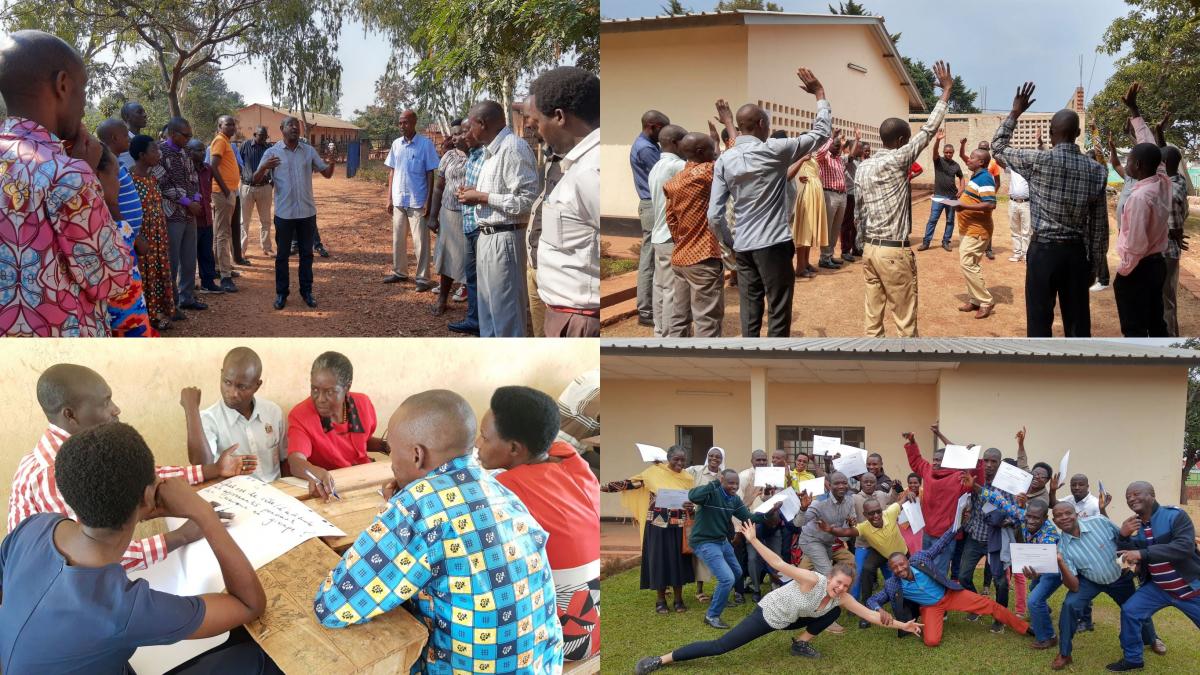
Au Burundi, on améliore les compétences pédagogiques pour renforcer la qualité de l’apprentissage dans les Centres d’Enseignement des Métiers
Donavine KWIZERA | 05/10/2021
L’un des objectifs du projet ACFPT est de renforcer les compétences des formateurs des 13 centres de formation accompagnés, afin d’augmenter la qualité des apprentissages et de favoriser l’attractivité de l’enseignement professionnel. C’est dans cette logique que l’ensemble du personnel enseignant a pu participer à des ateliers de renforcement d’une durée d’une semaine sur les bases essentielles en pédagogie. Pour concevoir des formations de qualité, le projet est parti du constat selon lequel la grande majorité des formateurs sont avant tout des techniciens n’ayant pas eu l’opportunité d’acquérir de prérequis pédagogiques au cours de leur parcours scolaire. Il s’agissait donc de créer une formation adaptée, en termes de contenus, répondant aux besoins concrets des équipes pédagogiques et permettant de faciliter l’exploitation des manuels créés précédemment dans le cadre du projet. Pour cela, un travail de sélection et de validation des thématiques à aborder a été opéré conjointement en amont par les formateurs et l’équipe du projet. Ce sont ainsi 10 notions de base qui ont pu être abordées au cours des renforcements organisés en trois sessions d’ateliers d’une semaine chacun, respectivement à Cibitoke, Gitega et Muyinga, et à destination de 196 formateurs, cela juste avant la rentrée scolaire 2021-2022 pour qu’ils puissent au plus tôt mettre en pratique leurs nouvelles compétences. Parmi les notions étudiées, il peut être cité les principales démarches, méthodes et outils pédagogiques, les techniques d’animation et de communication favorisant la création d’un climat propice aux apprentissages ou encore la préparation des séances de cours. Pour que l’apprentissage d’un métier puisse être intéressant et avoir les retombées escomptées, le formateur doit adopter des approches pédagogiques différentes de celles qui lui sont familières, c’est-à-dire des démarches innovantes, créatives qui rendent cet apprentissage interactif et participatif. Parmi les approches pédagogiques explorées, il a par exemple été retenu que la pédagogie différenciée est une bonne approche qui encourage les formateurs à s’adapter aux différents types d’apprenant (niveau, genre, âge, motivation, mode d’apprentissage). « La formation nous a été utile car ça nous a permis d’avoir des notions de base en pédagogie, de changer la mentalité pour être des formateurs aidants qui facilitent, accompagnent et guident les apprenants » Béatrice Jenjegeri, formatrice au CEM Bwoga. Dès le mois prochain, ces centres appuyés par le projet recevront, sous la supervision de l’axe qualité du projet, un accompagnement de proximité via des coachs pédagogiques et les Directeurs Techniques pour les aider à mettre en pratique leurs nouveaux savoirs. Par ailleurs, il est prévu d’organiser des retours d’expériences/échanges de pratiques ainsi que d’autres sessions de renforcement de capacités afin d’accroitre encore la qualité des enseignements dispensés. Ainsi, si ces ateliers ont été une réelle réussite, cela n’est que la première étape d’un processus s’inscrivant dans le temps.

